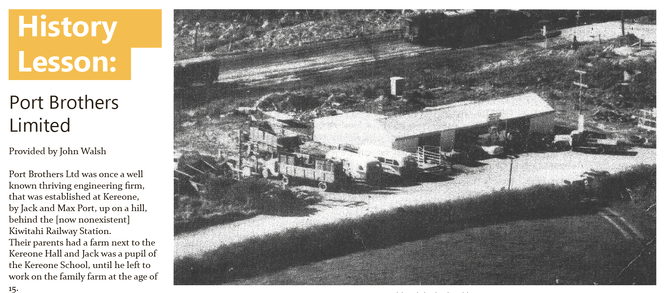Provided by John Walsh, published in Morrinsville News, 12 February 2015.
Port Brothers Ltd was once a well known thriving engineering firm, that was established at Kereone, by Jack and Max Port, up on a hill, behind the [now nonexistent] Kiwitahi Railway Station.
Their parents had a farm next to the Kereone Hall and Jack was a pupil of the Kereone School, until he left to work on the family farm at the age of 15.
His mechanical skills were soon seen by the local Kereone fraternity, when he built a farm tractor from an old model A Ford.
At the outbreak of World War 2, Jack joined the N.Z.A.F. and was posted to an island near Bougainville, to repair and service American planes. On his return to New Zealand, he got a job as an apprentice mechanic for Hudson Motors in Te Awamutu. His younger brother Max, had also completed his apprenticeship. Together they came back to Kereone in 1949 and formed Port Bros Ltd. With a demolished shed and the barest of equipment, they were one of the first country garages to get permission to build on NZ Railway lease land.
With local support, business boomed, and it was not long before they saw the need to branch out into welding and farm machinery repairs. A blacksmith/welder was employed, along with a local boy John Cameron as an apprentice.
The business soon became involved in building new walkthrough cowsheds over the winter months, followed by internal race cowsheds, and later the revolutionary herringbone cowsheds.
Jack Port was always thinking and experimenting with new ideas to revolutionize manufacturing techniques, and equipment.
I remember as a child, neighbour Alec Haynes’ new internal race cowshed being built.
It had the first high pressure water hose cleaning system fitted in it. Poor old Alec nearly took it out because of all the negative flak he received from the community. “Ha Ha, at least you will have hose to put out the fire if the cowshed ever catches on fire!”
Ports also designed their dairy sheds so that the pipe work was held together by Key clamps, so as no welding was needed on site. This also allowed for easier maintenance by farmers when required as most farmers of this era weren’t skilled with the use of welders.
Huge numbers of conventional Port haysheds were built with steel trusses fabricated by Port Bros. Many of them are still standing today.
They were the first firm to design and build a convertible sheep/cattle crate which allowed for greater flexibility for trucks to carry either type of animal.
They manufactured the Lilley Silorators, the well known V shaped Henry silorator cages. The company also made steel gates, to replace farmers homemade wooden ones, and cattlestops. Rotary drain cleaners driven by a tractors PTO was another development of Port Bros, which threw soil, mud, and slosh high up in the air.
Various uniquely designed haybale loaders, one type which I remember picked up haybales with a hydraulically operated lift arm attached to the front drawbar of a trailer.
It was towed by a tractor, and used the tractors hydraulic coupling system to operate.
They also built the well known Barbour hay conditioners by the hundreds, not only for the New
Zealand market but for export.
They were always designing and creating new products including buckrakes, rear forklifts and
loaders attached to a tractors three point linkage system, and even an automatic bloat oil applicator for use in cowsheds.
Port tipping farm trailers were developed, using a vertical hydraulic ram attached to the trailers drawbar, forward of the deck. It made use of a steel cable over a pulley to lower the gearing down, so as to give greater lifting capacity when unloading.
They also manufactured tractor carry trays made completely of steel, including a plate steel deck, which was able to be hitched up to a tractor without the driver having to disembark from the seat.
An enquiry from the Holm Shipping Co. gave Port Bros Ltd the opportunity to develop what was to become a multimillion dollar business in later years. [Later to purchased by the Fletchers Corp].
Collapsible shipping containers were first developed at Port Bros Ltd in the 1960s and Transport Container Pool Ltd was formed.
These containers met strong opposition from the Wharf Union members in the early days where they were rammed by loaders, dropped into the sea or refused to be handled, but Port Bros kept producing them.
The labour force of the business increased to over 50 staff when the container manufacturing division moved into Morrinsville.
The move by Port Bros Ltd into pressurized container development for moving granular products was so far ahead of its time.
With the huge expense of research and development, along with the ill health of Jack Port, the business was forced to close down in 1970.
The brand name Ports didn’t disappear for a number of years afterwards as the Port Farm Trailers and the all steel Port Tractor Carry Trays, continued to be manufactured in Morrinsville by a subsidiary company still with the name Port Ltd, which then belonged to business man Tom Laurent, who at that time was Morrinsvilles’ Alpha Laval Milking Machine Agent.
I wish to acknowledge and thank Vern Johns, employed by Port Bros Ltd in the 1960s, and Tom Laurent for their help in verifying and confirming the content of this article.

